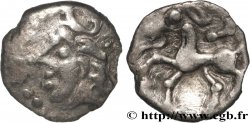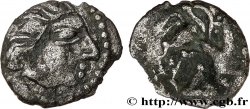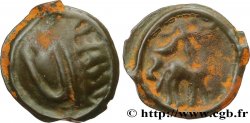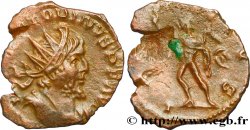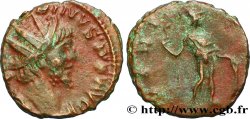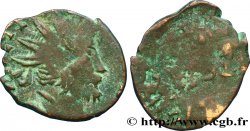bga_963820 - GALLIA - LEMOVICES (Area of Limoges) Statère à la grue, en argent / billon
Quantity
Add to your cart

Type : Statère à la grue, en argent / billon
Date: c. 100-50 BC.
Mint name / Town : Limoges (87)
Metal : billon
Diameter : 16,5 mm
Orientation dies : 9 h.
Weight : 6,14 g.
Rarity : R3
Coments on the condition:
Flan centré, court et épais. Une agréable tête au droit. Usure fine et régulière. Patine grise
Catalogue references :
Obverse
Obverse legend : ANÉPIGRAPHE.
Obverse description : Tête à droite, la chevelure en grosses mèches aquitaniques, l’oreille marquée.
Reverse
Reverse legend : ANÉPIGRAPHE.
Reverse description : Cheval à droite, une grue posée sur la croupe entre deux annelets pointés ; un trèfle entre les jambes.
Commentary
C’est la troisième fois que nous proposons ce type à la vente ! Avec un flan de presque 5 mm d’épaisseur et un métal très fortement chargé en argent, cette monnaie se distingue des frappes en or et en bronze ; si le style de flan correspond aux monnaies en bronze, cet exemplaire en billon ou en argent semble être sans équivalent et manquer aux ouvrages de références !
Le motif d‘accolade partant de la bouche devant le visage, est parfois interprété comme le signe de la parole ; on retrouve ce détail sur les statères des Bituriges, mais aussi sous forme des deux dauphins, plus ou moins stylisés, sur la plupart des monnaies d’argent du sud, dites “à la croix”.
Le motif d‘accolade partant de la bouche devant le visage, est parfois interprété comme le signe de la parole ; on retrouve ce détail sur les statères des Bituriges, mais aussi sous forme des deux dauphins, plus ou moins stylisés, sur la plupart des monnaies d’argent du sud, dites “à la croix”.








 Report a mistake
Report a mistake Print the page
Print the page Share my selection
Share my selection Ask a question
Ask a question Consign / sell
Consign / sell
 Full data
Full data
